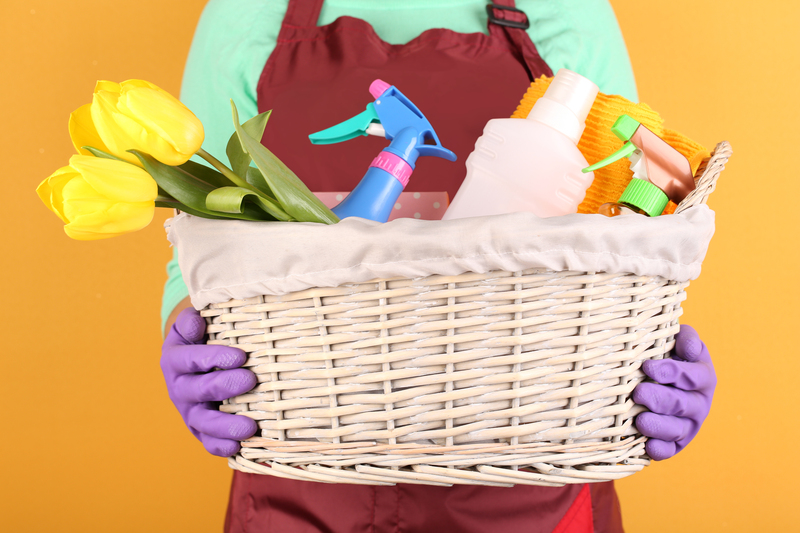Twinkle Tips: Best Practices for Jewellery Maintenance
Posted on 12/06/2025
Twinkle Tips: Best Practices for Jewellery Maintenance
Jewellery is more than just an accessory; it's an expression of personal style, treasured memories, and often significant financial investment. To ensure your cherished pieces maintain their gleam and sparkle, proper jewellery care and maintenance are essential. In this comprehensive guide, we'll reveal expert-approved twinkle tips and the best practices that will keep your jewellery looking its stunning best for many years to come.

Why Jewellery Maintenance Matters
Over time, exposure to daily wear, dust, cosmetics, and environmental elements can dull the brilliance of your jewellery. Regular maintenance not only preserves beauty but also prolongs the life of each item. Damaged prongs can lead to lost gemstones, while tarnish and grime can permanently affect delicate metals.
Proper jewellery maintenance reduces the need for costly repairs and lets you continue wearing your favorite pieces safely and confidently.
General Jewellery Maintenance Best Practices
Maintaining jewellery, whether it's solid gold, silver, platinum, gemstones, or costume pieces, requires consistent attention. Here are some universal tips for jewellery care:
- Clean regularly: Dust and oils from your skin can dull jewellery. Frequent gentle cleaning restores lost sheen.
- Store properly: Avoid tangling, scratching, or tarnishing by organizing your items carefully.
- Keep away from chemicals: Perfume, lotions, and cleaning products can damage metals and stones.
- Wear with care: Remove jewellery during chores, workouts, or bathing to prevent accidental damage.
- Professional servicing: Schedule annual checkups with a jeweller, especially for valuable items.
1. How to Clean Your Jewellery at Home
The simplest jewellery cleaning technique often uses items you already have. However, it's crucial to know your materials before cleaning: some gemstones and metals require special care!
-
Gold, platinum, and diamond jewellery:
- Mix a few drops of mild dish soap with warm water.
- Soak jewellery for 15-20 minutes.
- Use a soft-bristled toothbrush to gently dislodge grime.
- Rinse thoroughly and pat dry with a lint-free cloth.
-
Silver pieces:
- Use a special silver polish cloth to remove tarnish.
- A paste of baking soda and water can help with more stubborn spots.
- Never use tissue or paper towels; they can scratch.
-
Sensitive gemstones (such as opals or pearls):
- Wipe with a damp, soft cloth only.
- Avoid soaking; never use ultrasonic cleaners or strong chemicals.
Pro Tip: Always check gemstone settings after cleaning to ensure they're secure.
2. Storage Solutions to Prevent Jewellery Damage
Proper jewellery storage is a key factor in preserving both your collection's shine and structure. Here's how you can store your pieces safely:
- Individual compartments: Store each piece separately to prevent scratches and tangling, especially for chains and delicate stones.
- Soft, lined boxes or pouches: Choose options made of velvet or felt to cushion your jewellery.
- Avoid humidity: Use silica gel packets to absorb excess moisture, keeping tarnishing at bay.
- Keep away from sunlight: Prolonged exposure can fade gemstones and damage adhesives.
Store your jewellery in a cool, dry place. For special pieces, a safe deposit box offers extra protection.
3. Understanding the Enemies of Sparkle: What to Avoid
Prevention is better than cure when it comes to jewellery maintenance. Here are some factors to look out for:
- Household chemicals: Bleach, chlorine, and ammonia found in household cleaners can erode precious metals and dull gemstones.
- Beauty products: Apply perfumes, lotions, and hairsprays before putting on your jewellery to avoid residue buildup.
- Physical activity: Remove your jewellery before swimming, exercising, or undertaking rigorous chores.
- Temperature extremes: Rapid changes can fracture stones like opals and pearls.
4. Special Tips for Different Types of Jewellery
Gold Jewellery
- Polish gently; avoid abrasive materials.
- Store separately to prevent scratching other pieces.
- Keep away from chlorinated water, which can cause pitting.
Silver Jewellery
- Wear often; unused silver tarnishes faster.
- Store in anti-tarnish pouches or use anti-tarnish strips.
- Polish with a soft cloth after each use.
Gemstone Jewellery
- Avoid ultrasonic cleaners for porous and soft stones (e.g., opal, turquoise, pearls).
- Use a damp cloth, and avoid harsh detergents.
- Keep out of direct sunlight and away from heat sources.
Pearls
- Wipe with a soft cloth after use to remove natural oils.
- Never soak in water or cleaner.
- Store flat, wrapped in a silk pouch, away from harder gems and metals.
Jewellery Maintenance: Professional Care
For high-value pieces or those with intricate designs, professional jewellery servicing is essential. A trained jeweller can:
- Inspect and tighten gemstone settings.
- Clean pieces using ultrasonic and steam technology (only if suitable for your jewellery type).
- Buff out scratches and restore lost shine with expert tools.
- Advise on repairs or necessary restoration to avoid costly loss.
Schedule annual maintenance for engagement rings, family heirlooms, and other significant pieces to ensure longevity and beauty.
Frequently Asked Questions About Jewellery Maintenance
How often should I clean my jewellery?
Light cleaning at home should be performed after every few wears for daily pieces, while a deeper clean and professional servicing may be done once or twice a year depending on use.
Can all jewellery be cleaned the same way?
Absolutely not! Each metal and gemstone demands unique care. For example, while diamonds tolerate soap and water, pearls require only a soft cloth. Always research or consult a jeweller before attempting a new cleaning method.
Is it safe to use commercial jewellery cleaners?
Many jewellery cleaning solutions are safe for specific materials, but always check the label for compatibility. Avoid commercial cleaners for soft stones and pearls.
Eco-Friendly Jewellery Cleaning Tips
Green cleaning methods safeguard both your precious jewellery and the planet. Natural cleaning solutions such as baking soda, vinegar (for silver), or gentle soap and water are generally effective and safe. Stay clear of harsh chemicals that may pollute water systems or harm jewellery.
- Use a toothbrush made from sustainable materials.
- Choose lint-free cloths that are washable and reusable.
- Opt for biodegradable cleaning agents whenever possible.
Preserving Vintage and Heirloom Jewellery
Antique and heirloom pieces require extra attention. Vintage jewellery care often means minimal intervention--never attempt aggressive cleaning or polish, and avoid water immersion.
- Keep vintage items in climate-controlled boxes.
- Consult a specialist before attempting any repairs.
- Document and appraise family heirlooms for insurance purposes.

Best Jewellery Maintenance Practices: Quick Reference Guide
- Clean regularly--not aggressively.
- Store individually in lined pouches or boxes.
- Remove when swimming or exercising.
- Avoid exposure to chemicals and direct sunlight.
- Insure valuable items for peace of mind.
Conclusion: Keep Your Jewellery Sparkling with Expert Twinkle Tips
With these twinkle tips and best practices for jewellery maintenance, you can safely care for your entire collection, from everyday favourites to priceless treasures. Building these habits will ensure every necklace, ring, and bracelet retains its original beauty and value, allowing you to pass them down as lasting legacies.
Remember: Consistency is key. With regular attention, proper storage, and a little expert support, your jewellery will always shine bright.
Share Your Jewellery Maintenance Secrets!
Do you have tried-and-true jewellery care tips? Tell us your favourite methods or ask a question in the comments below--you could help someone else keep their jewellery twinkling for years to come.
```Latest Posts
How Air Quality Management Transforms Residential and Commercial Experiences
Streamline Your Cleaning with Clever Techniques
How to Safeguard the Fabric When Washing Velvet Curtains





